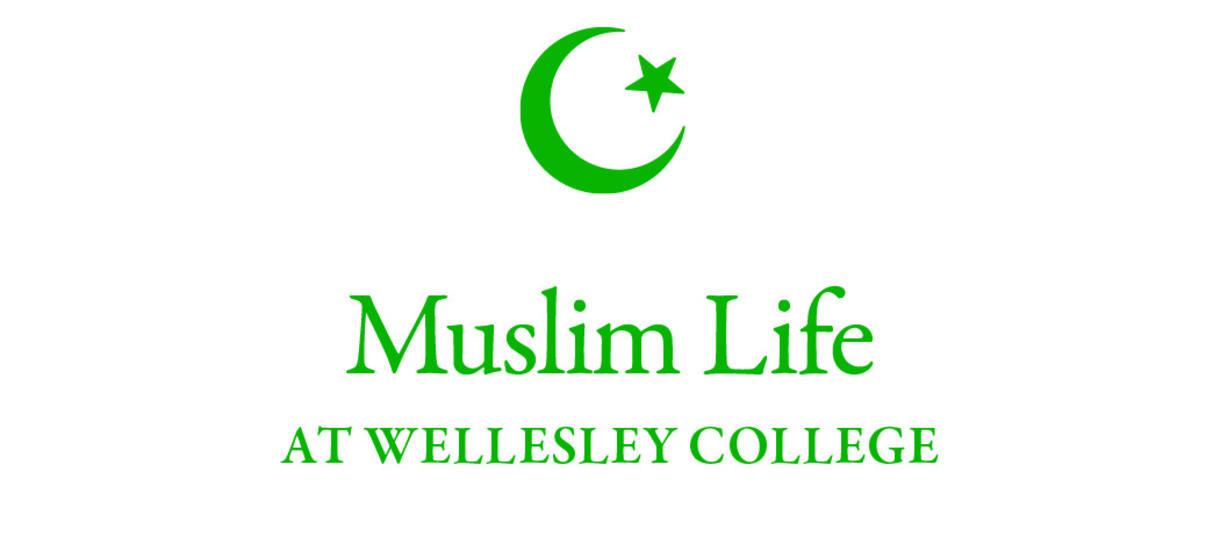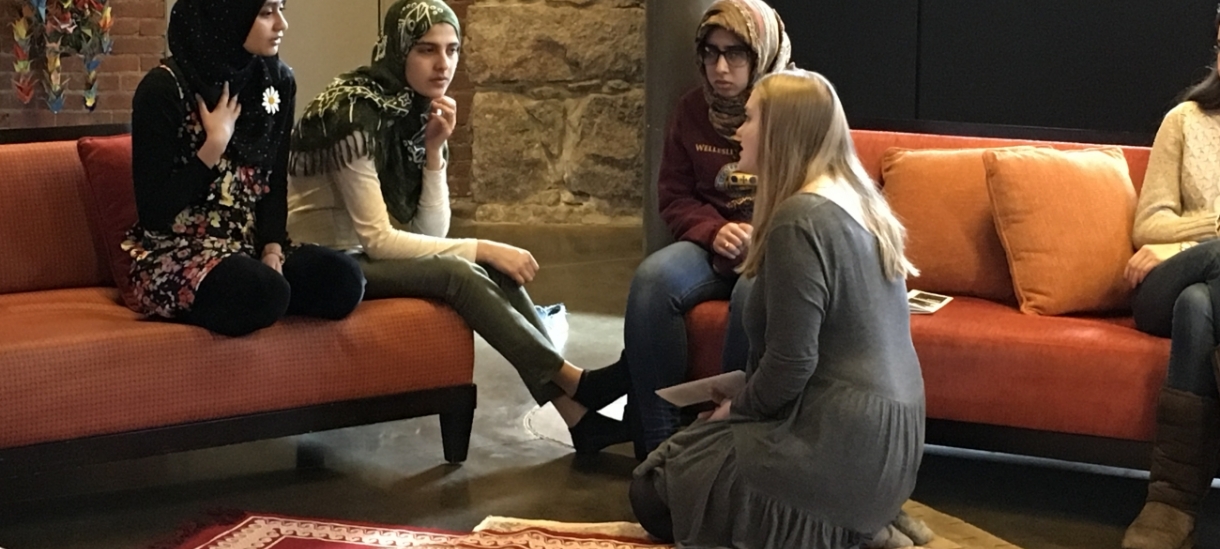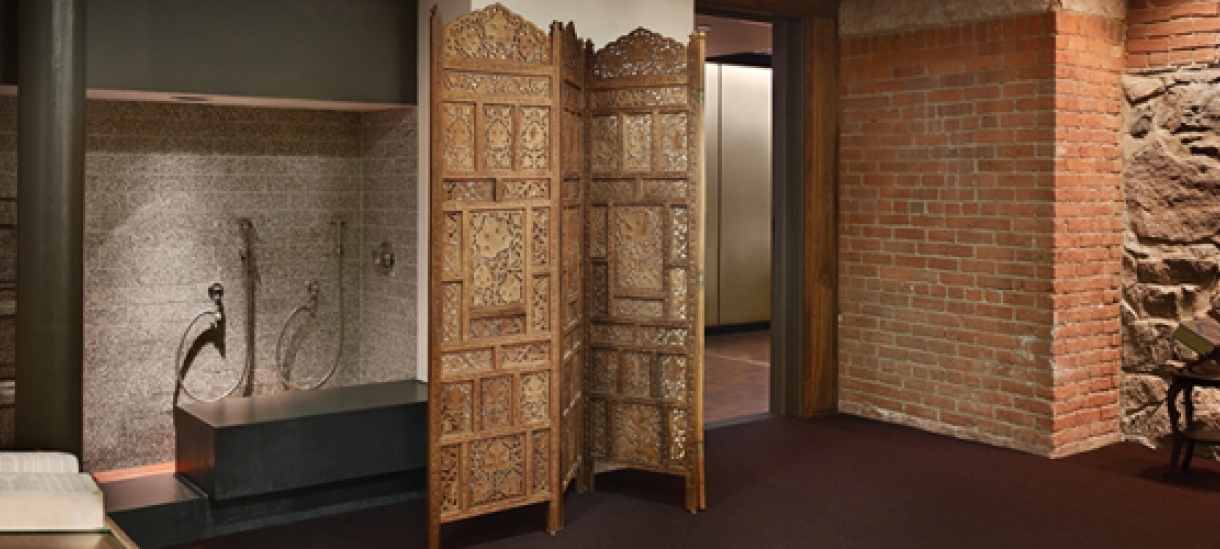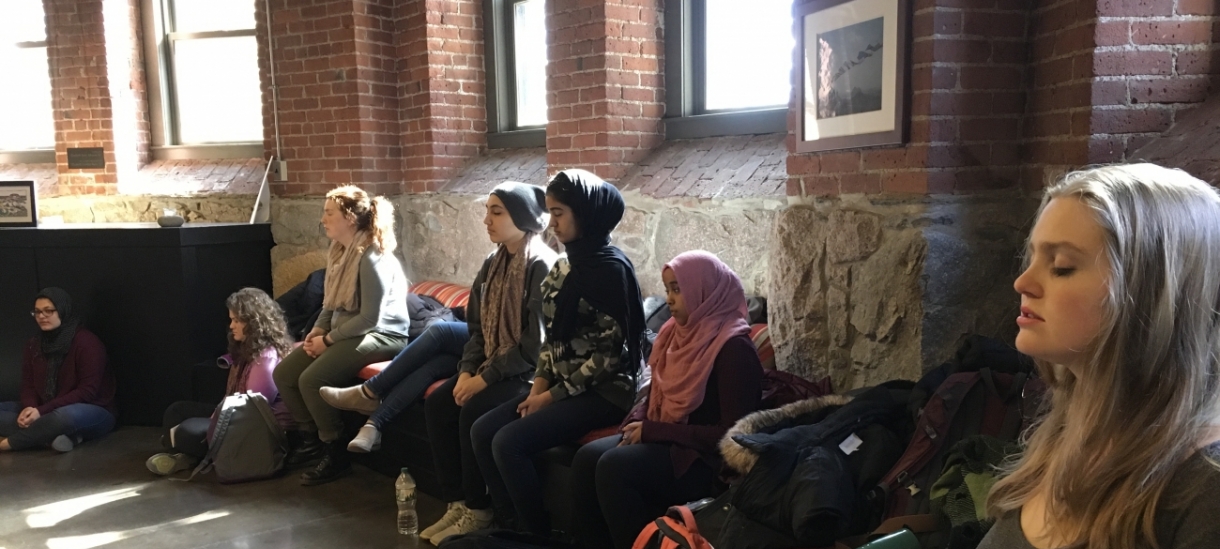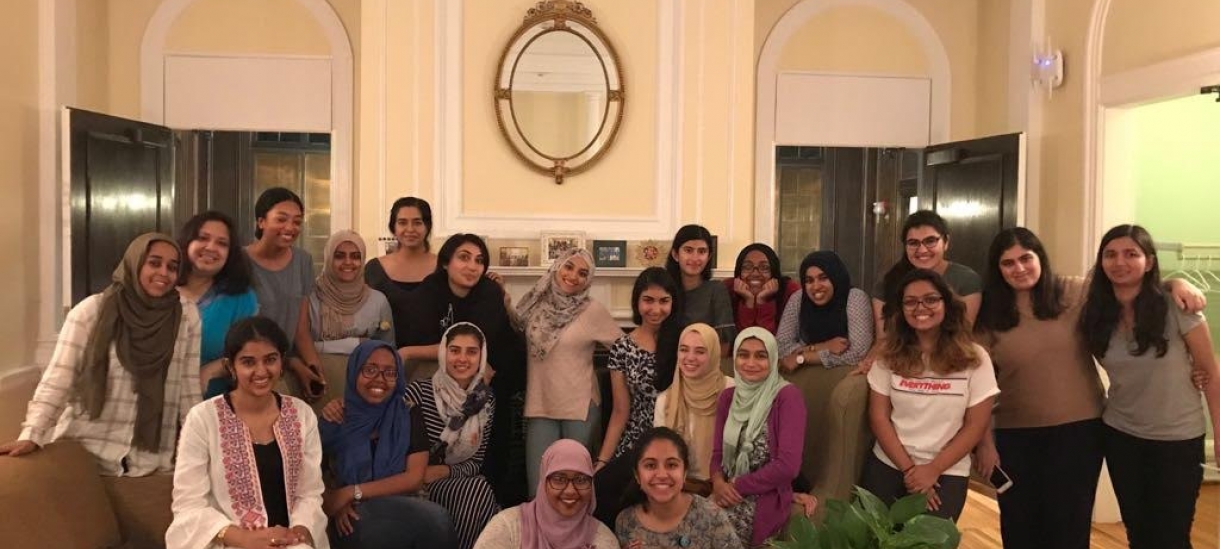The Wellesley Muslim Community seeks to build a connection between Muslims of all backgrounds and to be engaged with the campus community. This means exploring one’s connections to Islam, learning about ourselves and others.
We gather for big events such as the Eid Prayers and Celebrations, Iftars (breaking fasts), and for small group discussions dedicated to understanding Islam and contemporary issues. Friday Prayers (Salat al-Jum’ah) are in the Multifaith Center.
The Office of Religious and Spiritual Life supports faculty, staff, and students through counseling, advocacy and programming. The College Chaplain and Muslim Life Coordinator works closely with the Muslim student organziation, Al-Muslimat (ALM), which offers many events, from educational lectures to social programs on and off campus. Muslim students can speak with the chaplain about academic, personal, religious, and cultural issues.
Anla bi thikri lahi taTma'in al-qulub? “Isn’t it so, that by the remembrance of God, hearts are contented?” - Quran 13:28
"Your task is not to seek for love, but merely to seek and find all the barriers within yourself that you have built against it." - Rumi
For more information, contact College Chaplain and Muslim Life Coordinator Amira Quraishi.
Chaplains are also available for counseling - Why Talk to a Chaplain?
For many students, this may be the first time they have experienced being a part of a Muslim community or meeting Muslims who are different from them. ORSL welcomes anyone interested in learning about Muslim life and/or participating in Islamic practices. We are a community that invites us to know Muslims from diverse ethnicities and various ideological perspectives as well as multiple intersectionalities of identity. As part of a women’s college, ORSL also lifts up women’s spiritual leadership, which means that women lead prayers and rituals that are typically led by men in mixed-gender congregations. This is a unique opportunity to encounter the spiritual lives of Muslim women in a way that shapes this community. We strive to create a welcoming community where everyone can explore, question, and deepen their connection to Islam and Muslim cultures.
The Tower dining hall offers exclusively halal meat, alcohol-free ingredients, and vegetarian based soups, dressings and gravies. For more information about the range of legal opinions regarding what constitutes halal/zabiha meat, contact our office.
During Ramadan
-
Special accommodations, as applicable, are provided during fasting periods. Use of alcohol in cooking is labeled campus wide. For more information visit Wellesley AVI Fresh.
-
Tower offers a “Suhoor Bar” for students to gather items to take back to their dorm rooms for their pre-dawn meal later that night. The Suhoor Bar opens at dinner time. Dates are provided at iftar in Tower.
-
ORSL hosts weekly iftar dinners.
Friday Jum'ah Prayers
A traditional Islamic congregational prayer like that which is held at any mosque (masjid), led by the Muslim College Chaplain or a student. It includes a short khutbah (sermon) for spiritual reflection. At Wellesley, we gather afterwards for chai and conversation.
Ramadan
ORSL and Al-Muslimat (ALM) coordinate to provide several events, including Ramadan vision board craft, on-campus taraweeh prayers twice a week, Quran study and iftars.
Eid Prayers
ORSL hosts a community brunch on campus.
Prayer Spaces
The following spaces are shared by the entire Wellesley Community for the purpose of prayer and spiritual wellness. They each have materials needed for a Muslim prayer (rugs, copies of the Quran, scarves, clay “turbah” headrest.) The Prayer room in the MFC has a wudu station for ablutions. Please be respectful of worshippers by removing your shoes, being quiet in these spaces, and keeping them clean. Swipe access is needed after hours.
- Prayer Room in the Multifaith Center
- Prayer Room in the Science Center (near the entrance on the ground floor
- During Ramadan, a room near the Bae Pao Lu Chow dining hall is provided for prayers at iftar time (details to be provided each year by the Muslim Life Coordinator.
Muslim Life at Wellesley is guided by a number of Muslim principles.
RAHMA (compassion)
When encountering differences, it is easy to be confused and even judgmental, but differences, the Quran explains, exist in order to invite us to learn about ourselves and one another (Li’ ta`arafu 49:14). This openness and curiosity helps us create a more kind, compassionate and inclusive society. The prophet Muhammad said, “Show merciful compassion to those on earth and God will show merciful compassion to you” (al-Tirmidhī 1924). In Islam, the origin of every human being is with God in a natural, pure state (fitrah) before being breathed into a human form. Because of this divine origin, every human being deserves dignity, respect and compassion from each of us.
TAZKIYAT AN NAFS (polishing the mirror of the soul)
Students often express regret at not measuring up to what they imagine is a “good” Muslim, but Islam in practice is not simply checking off a list of rules and rituals. It is constant, honest self-reflection to lovingly hold our hardships and patiently improve our character with optimism and hope. Everyone experiences corrosive thoughts and emotions like anger, jealousy, resentment, etc. Each circumstance is an opportunity to improve one’s character, to develop taqwa (God-consciousness) and a joyful optimism for a healthy heart and a healthy, loving community. As Rumi says, “If you are irritated by every rub, how will your mirror be polished?”
MASLAHA (the common good)
Muslim theologians and jurists through the centuries saw Shari`ah and fiqh (Islamic law) as aiming to support the common good by relying on tradition of scriptures (naql) and our intellect (`aql). Solutions to new circumstances every year require us to use these two tools for the purpose of the common good. This principle reminds us to:
-
take into account those who are disenfranchised/less fortunate
-
consider costs and benefits of long-term and short-term strategies
-
think broadly about cooperation and education
Al-Muslimat (ALM, est. 1988) is a student organization for those who identify as Muslim, those who are interested in learning about Islam, as well as those who support Muslim life on campus. Through social, spiritual, charitable, and educational programming, ALM seeks to build community, celebrate the diversity of Muslim culures and religious practices, and increase understanding of Islam and Muslim life.
Find out more on the ALM Facebook Page and Instagram.
Advisor: College Chaplain and Muslim Life Coordinator Amira Quraishi.

